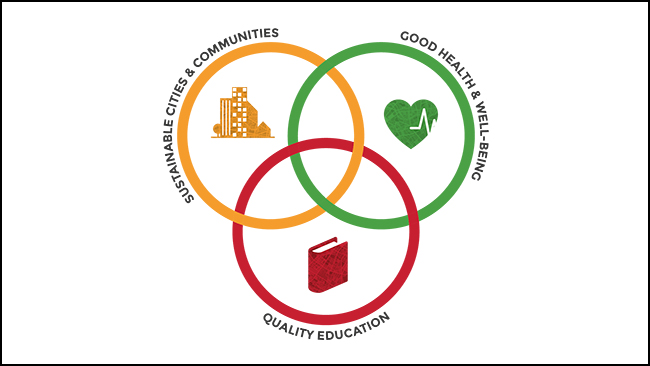Bringing local solutions to global urban issues
Our Centre for Sustainable, Healthy and Learning Cities and Neighbourhoods (SHLC) is addressing global urban, health and education challenges across fast-growing cities in Africa and Asia.
An international consortium of nine research partners, SHLC aims to provide policy makers and planners with more localised, contextual, and specific responses to urban issues on the ground.
Sustainable cities depend on a population having the resilience and resources that good health and quality education brings. Equally, health and well-being, and lifelong learning opportunities, depend on the development of sustainable cities and the neighbourhoods within them.
We must investigate the interconnection of urban, health and education challenges if we are to understand truly what makes a sustainable neighbourhood.
Over the past five years, the SHLC has led an extensive project collecting data from 14 of the world’s most rapidly changing cities, across seven countries.
The research targets the United Nations’ Sustainable Development Goal (SDG) 11 (making cities and human settlements inclusive, safe, resilient and sustainable), SDG 3 (good health and wellbeing) and SDG 4 (quality education).

Taking a novel approach to the research
International and national urban policies tend to operate at a very general level with policy makers having limited knowledge about the unequal distribution of opportunities, benefits and harm within the urban population. The SHLC works to generate such knowledge to tackle the challenges of social and economic unsustainability in fast-growing urban centres.
The Centre adopts a novel approach: instead of studying and/or comparing countries, it utilises an interdisciplinary, city- and neighbourhood-level lens to systematically investigate the complex connections and relationships between urban, health, and education challenges in neighbourhoods.
Unlike most studies, the researchers decided to shift from studying large cities to studying and comparing two cities in each country: one major national city and one ‘typical’ regional city. This allows them to draw comparisons from several dimensions: within country and region, between countries and regions, and between different economic development levels and types of cities and neighbourhoods.
Interdisciplinary research and capacity-strengthening activities will move debate from an emphasis on the physical and environmental aspects of ‘sustainable cities’ towards a deeper understanding of how rapid urbanisation and increasing migration is impacting the social and economic sustainability of neighbourhoods within cities.

Professor Ya Ping Wang
Principal Investigator, SHLC
“We have a lot of understanding of sustainable cities related to environmental changes and land shortages”, explains Principal Investigator Professor Ya Ping Wang.
“In the past, the research tended to talk a lot about environmental change, about the urban sprawl, about poverty. But we don’t really have a full understanding of the whole range of residents and neighbourhoods in the cities. So, this project is to try to understand the city better from inside with a neighbourhood perspective.
“We try to understand what the major problems are so we can make recommendations for the local government and national government to try to do something in that area, to improve the social economic side of sustainability and to make the neighbourhood more resilient.”
Working in partnership
For a more locally driven, equitable, and effective approach, the SHLC formed an international consortium of nine research partners in eight countries: Bangladesh, China, India, the Philippines, Rwanda, South Africa, Tanzania and the UK.
As part of commitment to extend its work to the capacity strengthening of researchers in the global south, SHLC also supported 19 smaller collaborative research projects through its Capacity Development Acceleration Fund (CDAF). These projects extended the SHLC team and research into many other cities and countries.
Research output
SHLC teams have published a series of reports, research summaries, policy briefs, blogs and academic articles and special journal issues. Partner teams are working on a city report for each of the case study cities using the recently completed household survey data. These reports will be shared with the relevant local and central governments.
Publishing agreements have been signed for two books: Urban Policy for Sustainable Development in the Global South - New Strategies for New Challenges; and New Drivers of Division: Urbanisation and Spatial Inequality in Africa and Asia. Once published, these books will be accessible by the international research and policy making communities.
SHLC team members are also working on several cross-country/cross-city comparative analysis and papers, on subjects related to education, health and urban neighbourhood issues.
Centre for Sustainable, Healthy and Learning Cities and Neighbourhoods
Project funding
The project is funded by the UK government under the Global Challenges Research Fund, with the aim of generating greater understanding of the socio-economic challenges facing these fast-growing urban spaces.

